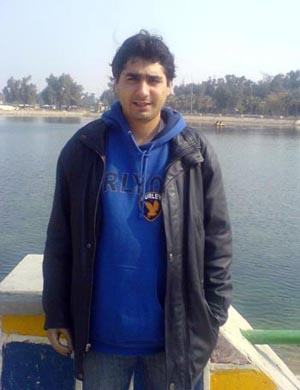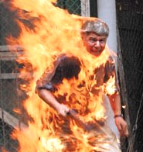"The police surrounded us. As my weapon jammed, I swallowed the cyanide capsule, but the poison had perhaps expired since it had no effect", remembers Arash Sametipour. The instructions were clear: "That they do not take you alive".
The terrorist, who was then 25 years old, released the safety lock of his last grenade and exploded it. Five years later and after several operations, Sametipour now has an artificial arm, but he is content with being alive and talks of brainwashing by a group that took to him close to death, the Mujahidin-e khalq.
He is not the only one who talks. The disappearance of Saddam Hussein’s regime has led to the discovery of horror hidden behind the walls of this Iranian armed opposition group.
In its report “No Exit”, published in May, Human Rights Watch revealed the abuses and violations of human rights in the camps of this organization during the last two decades. The testimonies gathered by Human Rights Watch in Iran corroborate the descriptions of solitary confinement, forced confessions, execution threats, beatings and torture of those who tried to leave the group.
To Iran’s surprise and disappointment, Iraqi occupation by the US didn’t lead to dismantling of this military group, considered terrorist by Iran, the US and the EU. Members of this group (3,534, according to data gathered last March) remain disarmed in Camp Ashraf (a hundred kilometers to the northeast of Baghdad), since April of 2003.
Washington has granted them the status of “protected people under the Fourth Geneva Convention”. This agreement brought up the distrust of the Iranian regime – which issued a public pardon last year for all members of this group.
Since then, at least 273 militants have returned to Iran. Ali Moradi, 45, is one of them. He has returned to Iran five months ago. "Iraqi captured me as prisoner at the beginning of the war and I spent nine years in their jails", he says. There he was caught by the Mujahidin. "They visited us with very negative information on what happened in Iran and offered us freedom from jail only if we joined them; we were under heavy pressure given the circumstances. Eventually, about 150 of us joined them”, he adds.
Bad years
“Our joining the Organization was immediately made public by them and it made it impossible for us to return to Iran", remembers Moradi, convinced that the 15 years that followed were as bad as the nine previous ones. “I was married and I was in touch with my wife through the Red Cross when I was in jail, but after joining the Mujahidin I could no longer do it. My family thought that I had died and my wife married another man. That isolation was part of the ideological revolution promoted by the leaders of the group.”
"They didn’t let us have feelings towards women, mothers, children, or even to speak about it with friends. We had to write daily reports on the weaknesses of our friends. According to Moradi, there were two meetings of that type: “Current, daily critical meeting which tortured the spirit, and the weekly. In weekly meetings, we were forced to write down our feelings towards the women we had imagined during the week, and we had to talk about it in public, and this is really difficult regarding our Iranian culture”.
Moradi had Marxist ideas and paid for it. “They separated me from the rest and did not let me participate in their meetings and religious ceremonies because the ideology of Mujahidin was based, at least initially, on an interpretation of Islam as a revolutionary message. I felt to be under pressure”.
Finally, five years ago he was expelled from the Organization, and according to HRW’s report, was put into internal jail of the MKO (iskan). “We were 13; a Christian, a member of an ethnic minority, and the rest were all Marxists”.
Without documentation, without contact with the outside world, the only alternative was Abu Ghraib, the notorious Iraqi prison. The most prominent MKO dissidents finished there. They were the first ones to reveal the techniques of brainwashing and arresting dissidents inside the organization. Even the arrival of the US Army couldn’t halt the leaders of the group.
"They neither had arms nor could they maintain the pressure in their prisons, so I requested to leave them; after several meetings – in which they threatened me like a prisoner – one of my friends helped me pass a message to an American officer and explain the situation for him. They transferred me to their camp and I was able to return to Iran with the assistance of the Red Cross.”
Mujahidin-e Khalq was formed 1965 as an anti-Shah group. Nevertheless, after the Islamic revolution, it did not find a place in the new order and continued to fight against the clergymen who led the revolution. A rebellion 1981 ended with its ringleaders in jail and many of its members in exile. They settled in France until 1986, when the French Government started to improve its relations with Tehran and the leadership of the group – controlled by Massoud and Maryam Rajavi – was transferred to Iraq. In the war against Iran which started in 1980, the regime of Saddam provided the group with all types of facilities, including camps and training the military forces.
Since 1988 (when the war ended) their activities were reduced, although they continued to count on the help of Baghdad for infiltration in Iran and attempting to assassinate senior Iranian authorities or official buildings. On the eve of the presidential elections in 2001, several commandos crossed the (Iraqi) border and entered Iran and tried to create chaos and also to prevent the re-election of Mohamed Khatami. For instance, they fired mortars at Police Headquarters in Vozara street. There were no dead, but it angered the authorities.
The Story of Babak Amin
The person in charge of the attacks on Vosarat street, Babak Amin, now 40, has returned to continue his studies in the field of communication that he had left in 80s. "I studied at the University of Vienna and there I made contact with the members of the group (hypocrites); I was looking for an organization which fought to bring democracy and freedom to my country, and this group’s propaganda on Iranian regime’s human rights violation attracted me.” Along with some friends, without informing their families , they went to Iraq. They received two months of military training in Jalilieh Camp in Iraq’s Kurdistan and then became members of the Organization.
The beginning of their work in MKO coincided with the arrival of the Rajavis in Baghdad and the formation of the National Liberation Army, the guerilla army and the military arm of the organization. “Camp Ashraf was established and we began to receive professional military training from Saddam’s Republican Guard", remembers Amin. Then he points to several operations against his country in which he participated, while he adds that heavy military trainings came after the end of the war.
"In 1990, the organization initiated another ideological revolution: “the married members had to divorce; the fiancés had to break up, and all members had to accept the supreme leadership of Rajavi and his wife.
Amin relates these stories while his hands are empty; he lost the best years of his life in a useless persistence. His leaders allowed their members to act as the soldiers of Saddam and during the Iraqi invasion to Kuwait, Mujahidin were sent to Khanequin to suppress the Kurds. As the situation worsened, the Rajavis deepened their ideological revolution. In 1993, the turn came for “the positive discrimination, a step in which the army took the nickname of a character of American novels.
“The military leaders had to yield their posts to women, and thus I became number two in my company”, explains Amin. Amin was also the director of attacking Tehran, which led to his arrest.
In 2000, Maryam Rajavi, new leader of the militants, deployed several operational teams to Iran to foment chaos before the presidential elections of 2001. But military commanders never crossed the Iranian borders. “10 operations directed by me in Tehran were successful. Soon, the arrival of provisions from Iraq came to a halt and we had to interrupt the work. Khatami won the elections and we received orders to return, but the janitor of the house where we lived exposed us”, Amin recalls.
After settling accounts with the Iranian judiciary, Amin has returned to university and counts on the support of his parents to live, although he has resorted to the aid of a psychologist in order to start a normal life.
Moradi is also trying to remake his life in his hometown, Khorramabad. But he’s unemployed. “After 25 years of life, I have nothing except these clothes”.
the young Sametipour, has not forgotten Elham yet, the young daughter of a MKO activist. He had fallen in love with her but he never saw her again after joining MKO Iraqi camps in 1999. Now, he dedicates himself and his time to an NGO [Nejat Society] which supports the families of those MKO militants who have not returned yet.
EL PAIS



